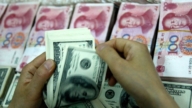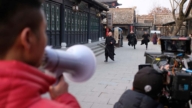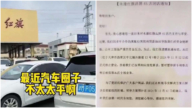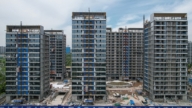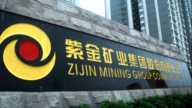【新唐人2012年9月29日訊】房地產一直是擾動中國經濟起落的不穩定因素,高房價是中國經濟最大的泡沫,中國樓市像一個燙手山芋,下一屆的領導班子會怎麼接?我們來聽聽專家怎麼說。
《路透社》財經分析專欄對中國的樓市提出問題,報導說中國房地產調控像個燙手山芋, 「緊」將拖纍經濟, 「鬆」則引發民怨,對中國將上任的十八大新一屆政府而言,調控到何種溫度,才能消除泡沫又不致過度傷及經濟? 「限貸、限購」又能持續多久?
美國「南卡羅萊納大學艾肯商學院」教授謝田認為,中國房地產造成今天燙手的狀態,是因為中共當局盲目發行貨幣刺激經濟,造成的結果。中國的GDP一半以上與房地產市場有聯繫,當房地產泡沫破裂時,整個經濟會崩盤。
美「南卡羅萊納大學艾肯商學院」教授謝田:「我覺得中共現在基本上的策略,他不敢繼續刺激讓泡沫增大,也不想讓房地產泡沫破滅,因為一旦破滅的話,勢必影響很多很多國營的企業,更大的房地產企業,還有拖垮銀行業,也會給中國經濟帶來更大的災難,他現在最好的辦法就是維持現狀。」
中共當局3年前實施房地產調控,推出限購、差別化住房信貸、加強稅收徵管、推行保障房等措施,其中又以限購、限貸的行政手段對市場衝擊最大。
北京師範大學MBA導師、經濟專欄作家段紹譯:「經濟自由才能使市場有所滋養,得到最有效的特色,『限購』就是使貨幣不能充分發揮貨幣的職能,所以就會使政府的權力膨脹。真正的調控,應該是整體提高社會資源的特級效率方面去調控。」
段紹譯認為,土地做為一個重要的資源,不該由執政單位獨佔,政府不該與民眾爭利。他表示,中國的土地應該私有化,產權合法化自然能達到抑制房價的作用。
北京師範大學MBA導師、經濟專欄作家段紹譯:「政府…不是干預市場,是彌補市場的缺陷,所以長期來講,如果土地能夠真正的私有化,一個農民他這塊土地是用來種地?還是用來蓋房子?由他跟市場…一樣,跟市場的價格(一樣)自由選擇。那也會讓房價回到一個合理的水平。」
高不可攀的房價讓普通老百姓買不了房,而高漲的房租更是讓人吃不消。
由於北京對外地戶籍人口買車、買房的限制,使得房租瘋狂似的上漲。根據北京統計局公布的資料,8月,北京CPI同比上漲2.7%,而住房租金則上漲4.7%。最近半年,北京的房租漲幅已經超過20%。
大陸媒體報導,年近30歲,畢業於「北京理工大學」的張培嶺,一個月薪水8500元,房租3800元,頂不住北京高漲的房租,他決定逃回老家。他感嘆,「 五年租房兩茫茫。天天漲價,無處話淒涼。」面對經濟和生活的雙重壓力,要在北京生活下去真的很難。
高房價帶來的「民不聊生」,是中國經濟最大的泡沫,下一屆的中共領導班子會怎麼接這個燙手山芋?我們將持續關注。
採訪/陳漢 編輯/黃億美 後製/郭敬
China’s Property Market: A Hot Potato-In-Waiting
Real Estate has long disturbed China’s economic stability.
High house prices are like a hot potato,
and the biggest bubble for the Chinese economy.
How will the Chinese Communist Party (CCP)’s
new leadership team tackle this tough issue?
Let’s see what the experts say.
Reuters Chinese website has questioned
the property market in China.
It described official real estate regulation as a hot potato.
A “tight" official policy will drag on the economy,
while a “loose" policy will trigger social grievances.
How will the incoming CCP leaders create a balanced policy?
How long will its policies of limiting
bank loans and home purchases last?
Prof. Xie Tian of Aiken Business School,
University of South Carolina, commented.
Xie Tian says that today, China’s real estate plight was
caused by the CCP authorities’ excessive money-printing.
The property market contributed to over half its GDP figure.
Thus, once the real estate bubble bursts,
China’s economy will face immediate collapse.
Xie Tian: “In my view, now the CCP is trying
very hard to prevent the bubble from growing.
It doesn’t want to see a bubble burst.
A burst property bubble is bound to affect lots
of state-owned enterprises and larger real estate firms.
The bank system will also be dragged down
and China will face a bigger economic disaster.
I think the best option for the CCP regime
is to maintain the status quo.”
Three years ago, the CCP regime
began regulating the property market.
Measures included restricting home purchases,
differential housing credit, strengthening tax collection and promoting affordable-housing programs.
Among these, the administrative policies of restricting
bank loans and housing purchases have provided the biggest impact on the property market.
Duan Shaoyi (MBA mentor, Beijing Normal University):
“Only economic freedom can nourish the market, and will allow it to function most effectively.
Limiting home purchases actually curbs the function
of currency, leading to expanding government control.
A real regulation should focus on elevating
the overall efficient use of the social resources.”
Duan Shaoyi adds that land, as an important resource,
should not be monopolized by administrative organs.
A government should not contend
for money with it’s own citizens.
Duan Shaoyi asserts that China
should allow land privatization.
Legitimate land rights will naturally cool the housing market.
Duan Shaoyi: “A government shouldn’t
meddle in the market, but smooth its flaws.
If land privatization occurs in China, a land owner will make
a decision of how to use the land based on the market.
This will also help bring the housing
prices back to a reasonable level.”
China’s rocketing house prices have made
it unaffordable to average citizens
Now many people are also forced
to face rising rental prices.
CCP Beijing authorities restrict car and home purchases
for people who do not hold local permanent residence status.
The policy has triggered surging rental prices.
Official data shows that in August, Beijing’s CPI rose
by 2.7% year-on-year, while housing rent rose by 4.7%.
In the last six months, Beijing rental
prices has risen over 20%.
A Chinese media report cited Zhang Peiling,
30, who is living in Beijing.
Zhang earned 8,500 yuan per month,
of which, 3,800 yuan goes on rent.
Feeling unable to afford Beijing’s living costs,
Zhang has decided to return to his hometown.
He sighed, “For the past five years, rental prices have kept
soaring. I have found nowhere to pour out my dreariness.”
High costs of living has made survival really hard in Beijing.
High house prices have caused a difficult environment
for many people to survive in, which has become the biggest bubble in China’s economy.
How will the new CCP leadership deal with this hot potato?
We will continue to watch this issue carefully.



